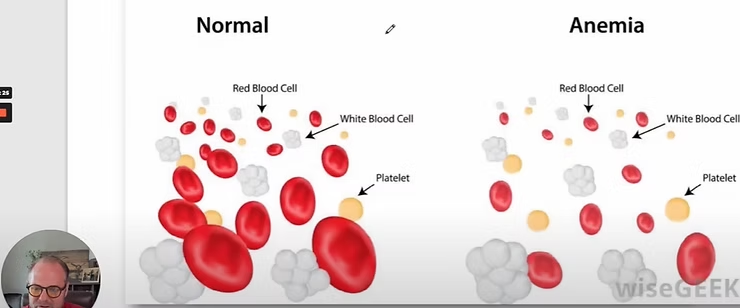Non-optimal Iron Status and Dementia
Conventional medicine is limited in defining if any relationship exists between a non-optimal iron status and dementia.
That’s why this guide provides all relevant details to connect all the dots and furnish you with correct guidance. Taking cues from what this guide offers is a smart way to understand how to beat dementia with ease.
Dementia – Causes, Symptoms, and Types
Dementia is a rapid loss of cognitive functions like remembering, reasoning, and thinking. It is common among older people and has a potential to interfere with someone’s life and regular activity. Advanced dementia may make sufferers lose control of their emotions and experience rapid, downward personality changes.
Dementia is caused by extensive loss or damage to nerve cells. These connections to the brain are responsible for regular functions humans complete each day, but dementia disrupts such activity. Dementia usually causes brain damage in different ways and affects people with unique symptoms.
Common symptoms of dementia include:
– Rapid memory loss – affects judgment and induces regular confusion in many cases
– Speaking difficulty – difficulty/inability to speak, understand, and express thoughts; stunted reading and writing ability
– Wandering – getting lost in previously-familiar surroundings
– Sharp spending changes – loss of frugality in handling money and settling bills
– Repetition – repeating questions and statements in conversations
– Hallucinations – along with bouts of paranoia or frequent delusions
– Movement difficulty – problems with maintaining balance during movement
Currently, about five types of dementia exist, but the most common diagnosis among adults points to Alzheimer’s disease.
Alzheimer’s & Mild Cognitive Impairment
Alzheimer’s is a gradually-developing neurological disorder that triggers brain atrophy (shrinking brain). The condition also causes brain cells to die and is a common cause of full-blown dementia in older people.
Alzheimer’s causes a continual degradation of social, behavioral, and other necessary skills humans need. People affected by this condition usually find it difficult to function without needing help.
Common symptoms of Alzheimer’s include:
– Sustained memory loss
– Non-existent learning ability
– Language issues (pronunciations, reading, and writing)
– Difficulty with numbers
– Low logical thinking and thought organization
– Short attention span
– Hostility to new situations
However, research has shown that Alzheimer’s develops from an early condition of mild cognitive impairment (MCI). But in some cases, MCI might not degenerate to Alzheimer’s.
MCI usually begins when someone loses things often, forgets appointments, and finds trouble piecing words together.
Being floxed and chronic fatigue
Floroquinolone toxicity is an occurrence among users of antibiotics that might lead to significant health problems. Most sufferers describe the condition as ‘being floxed’.
Extensive health challenges floxies suffer might cause intermittent bouts of chronic fatigue.
However, little verifiable info exists at the moment to unearth any perceived link between being a floxie and having dementia.
Anemia, dementia, and neurological problems
Low serum ferritin in the human body is a potent cause of anemia. Several research has shown that anemia is a high-risk factor in people likely to develop symptoms of dementia.
Iron deficiency is a major cause of anemia and results in negative changes in a human’s neurological and physiological mechanisms. Anemic people could have to deal with several cognitive development issues.
Dealing with anemia directly impairs coordination, regular functions, as well as memory and attention spans.
Taking a poly-therapy approach and overturning anemia
Beating anemia will be nearly impossible with a mono-therapy approach. A mono-therapy approach rests on one kind of treatment to combat and remedy the effects of anemia.
However, mono-therapy usually fails to solve any healthcare challenge, especially one as serious as non-optimal iron levels.
Adopting a dynamic, multi-therapy approach is the smartest way to overturn anemia to lead a healthier life. Consulting a qualified doctor to build your poly-therapy regime is the smartest thing to do. Taking such a step makes sure different options work together to improve resistance against anemia.
Anemic people could find it difficult to perform day-to-day tasks as cognitive impairment is one of its most common symptoms. Low hemoglobin levels in anemic people contributes to brain hypoxia, leading to reduced aerobic abilities and cognitive decline.
Cognitive brain function and its link to hemoglobin levels
Anemia is essentially a deficiency of red blood cells that contain hemoglobin. Several studies show proof that cognitive brain functions could experience significant reductions due to advanced anemic symptoms.
Increasing hemoglobin levels in anemic adults could be a remedy to repair its effects and return normal cognitive brain functions.
What is a Short Portable Mental Status Questionnaire (SPMSQ)?
The Short Portable Mental Status Questionnaire (SPMSQ) is a 10-item document administered by clinicians to determine patients’ mental functional capabilities.
Scoring for the SPMSQ is described below:
– 0 to 2 errors show normal mental functions
– 3 to 4 errors show mild cognitive impairment
– 5 to 7 errors show moderate cognitive impairment
– > 8 errors show severe cognitive impairment
Findings from the screening test can help to determine conditions like organic brain syndromes, cognitive impairment, and more.
Low Iron Levels and Brain Fog
Iron deficiency at anemic levels could be a major cause of brain fog in once healthy adults. Iron is required to transport oxygen through the human body and brain.
Low iron levels directly interfere with an adult’s ability to transmit oxygen to important areas like the brain efficiently. Such shortages result in brain fog and cause significant impairment in previously-easy functions.
Iron deficiency at anemic levels could affect adults across all age groups and should be addressed by all means.
Conclusion
Working with Dr. Hugh Wegwerth is a smart and effective way to recover from dementia in all its forms. With access to a wealth of resources, hands-on guidance and expert recommendations, it becomes comfortable to overcome dementia entirely.
Consultations are one-on-one and you can always reach out for advice on best steps to take towards living healthy again! No one deserves to live with the nagging symptoms of dementia.
So, what are you waiting for?! Get in touch now, and maintain your overall health the best way possible!
Frequently Asked Questions (FAQ)
Low iron levels (specifically low serum ferritin) are a direct cause of anemia, which research shows is a high-risk factor for developing dementia. Iron deficiency negatively changes neurological and physiological mechanisms, impairing cognitive functions like memory, attention span, and coordination. Anemia leads to brain hypoxia (reduced oxygen), causing cognitive decline that can progress to more severe conditions.
Iron is essential for transporting oxygen throughout your body and brain. When iron levels are low, oxygen delivery to the brain becomes inefficient, leading to symptoms like brain fog, memory problems, and difficulty with concentration. This oxygen shortage can eventually contribute to more serious cognitive impairment and neurological issues.
Yes, addressing iron deficiency, particularly through a comprehensive poly-therapy approach, can help restore cognitive function. Increasing hemoglobin levels in anemic adults has been shown to help repair cognitive damage and return brain functions to normal. A mono-therapy approach (relying on just one treatment) is often insufficient for complex iron-related cognitive issues.
Early signs include brain fog, difficulty remembering things, trouble finding words, losing items frequently, missing appointments, reduced attention span, and problems with logical thinking. These symptoms may indicate Mild Cognitive Impairment (MCI), which can develop from iron deficiency and potentially progress to more serious conditions like Alzheimer's if untreated.
Healthcare providers often use the Short Portable Mental Status Questionnaire (SPMSQ), a 10-item screening test. The scoring works as follows: 0-2 errors indicates normal mental function, 3-4 errors shows mild cognitive impairment, 5-7 errors indicates moderate impairment, and more than 8 errors suggests severe cognitive impairment. This helps identify conditions like organic brain syndromes and cognitive decline.









